- Quick Read
- Deep Read ( 6 Min. )
In Today’s Issue
- Why many in Ukraine oppose ‘land for peace’ to end the war
- Today’s news briefs
- Amid Gaza food shortages, ICC issues arrest warrant for Netanyahu
- Can Trump bypass the Senate to ram through controversial nominees?
- It’s more than money dividing nations at UN climate conference
- Loggers were stealing the forest. These women started stealing their chain saws.
- Good is ‘the strongest gravity,’ says ‘Wicked’ author Maguire
Monitor Daily Podcast
- Follow us:
- Apple Podcasts
- Spotify
- RSS Feed
- Download
TODAY’S INTRO
Safeguarding a forest home
Poachers and fires threaten the forest community of Olum, Nigeria. So does illegal logging, which robs wildlife of habitat and can trigger mudslides. Lucrative for outside firms, the practice also pays off for some in the community who help them.
Others take a longer view, and choose to exert agency. Contributor Saint Ekpali reports today on a remarkable band of women. The land has given them food, remedies, and what wood they need. In return, they now go on patrol, giving protection to the forest they love.
Share this article
Link copied.

Help fund Monitor journalism for $11/ month
Already a subscriber? Login

Monitor journalism changes lives because we open that too-small box that most people think they live in. We believe news can and should expand a sense of identity and possibility beyond narrow conventional expectations.
Our work isn't possible without your support.
Why many in Ukraine oppose ‘land for peace’ to end the war
Should Ukraine relinquish territory seized by Russia in return for an end to fighting? Opposition had been strong throughout the long war, but Ukrainians are shifting on whether their territory is inviolate. Still, distrust of Vladimir Putin runs deep.
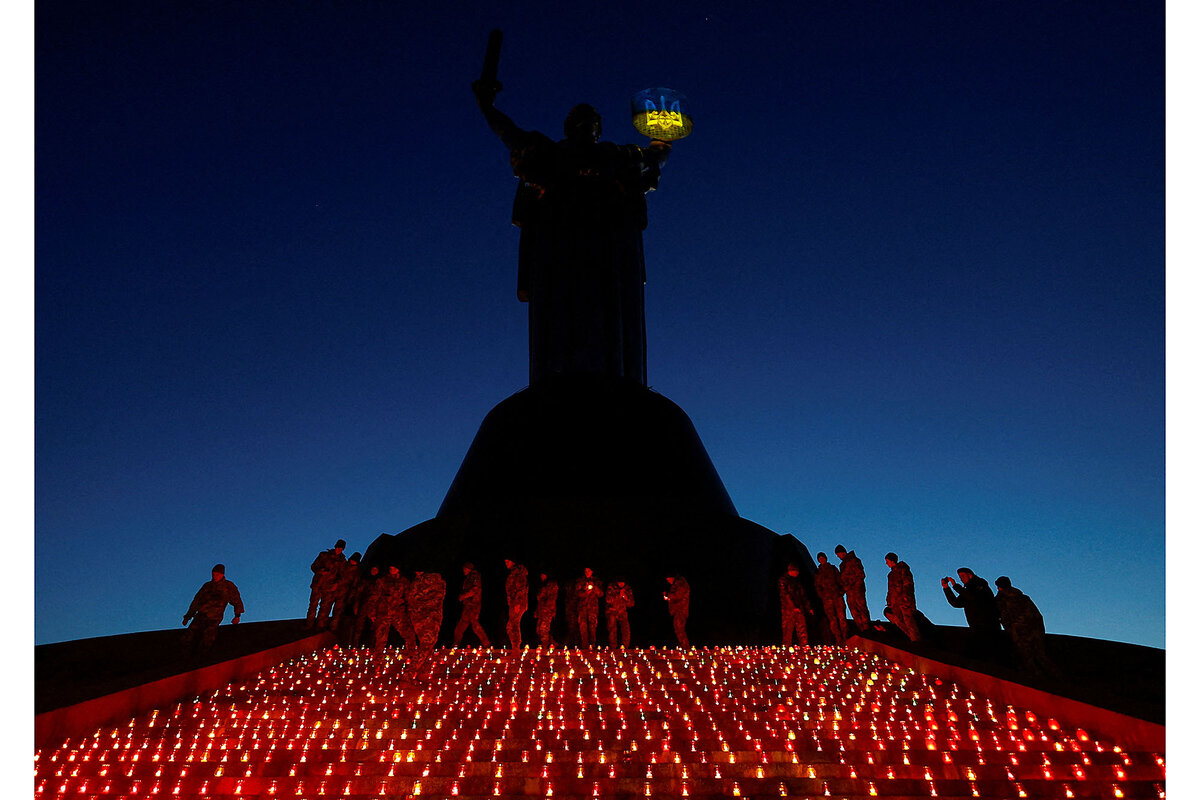
Russia’s steady gains along much of the Ukraine war’s battlefront have fueled doubts among Ukrainians that their military will ever reclaim significant swaths of lost territory.
And as pressure grows to reach a negotiated settlement, they are increasingly resigned that any peace deal will entail giving up much if not all of the land Russia now occupies. According to a Gallup poll published this week, 52% now say Ukraine should be willing to give up territory to end the war.
Still, many remain adamant that what is at stake is not just some eastern provinces bordering Russia, but Ukraine’s existence as an independent nation. And the notion remains strong that Ukraine’s acquiescence to Russia on the territorial issue would send a devastating signal around the world that force prevails over the rule of law.
“It sounds very good if it could end the war, but the truth is that if you give Russia one meter of territory, they will see that as weakness, and they will not stop until they take everything,” says Yevhen, an engineering student at Mykolaiv’s Black Sea National University.
“We Ukrainians know this,” he adds, “but it’s something the world must understand as well.”
Why many in Ukraine oppose ‘land for peace’ to end the war
Standing on the shrapnel-pocked steps of Mykolaiv’s Black Sea National University, second-year engineering student Yevhen ponders the seductive appeal of the formula “land for peace” for ending Russia’s war against Ukraine.
And then, like many of his fellow Ukrainians, he firmly rejects the idea.
“It sounds very good if it could end the war, but the truth is that if you give Russia one meter of territory, they will see that as weakness, and they will not stop until they take everything,” says Yevhen, who asked that his last name be withheld.
“We Ukrainians know this,” adds the student, whose city was blasted and bombed – but never occupied – following Russia’s invasion of Ukraine in 2022. “But it’s something the world must understand as well.”
For months Russia has advanced – slowly and at great cost, to be sure – along much of the war’s battlefront. That has fueled doubts that Ukraine’s military will ever reclaim significant swaths of lost territory.
Moreover, Russia’s steady gains have fed resignation that any peace deal will entail giving up much if not all of the 20% of Ukrainian territory Russia now occupies.
The impending return of former President Donald Trump to the White House is only the latest element in mounting pressure on Ukraine to reach a negotiated settlement with Russia.
Last week German Chancellor Olaf Scholz spoke with Russian President Vladimir Putin about ending the war, the first conversation between the two in nearly two years. The German government said Mr. Scholz expressed full support for Ukraine.
Even so, the outreach was panned by some NATO members and widely interpreted as another sign of fading Western interest in sustaining Ukraine’s military effort – and growing interest in a negotiated settlement.

Even President Joe Biden’s decision to allow Ukraine to use U.S.-supplied missiles to strike deeper inside Russia is seen by many analysts as an effort to position Ukraine better for the negotiations Mr. Trump is expected to push for, rather than to boost Ukraine’s ability to win the war.
Signs of escalation before any negotiations continued Thursday, as Ukraine said Russia had launched an intercontinental ballistic missile armed with conventional warheads at the central city of Dnipro. Russia refused comment, and U.S. officials reportedly said it was more likely an intermediate range ballistic missile. On Wednesday, President Biden authorized supplying Ukraine with antipersonnel mines to thwart Russia’s ground assault.
Public opinion shift
As Russia’s full-scale invasion – what Ukrainians now call “the big war” – reaches 1,000 days, signs are growing that more Ukrainians are shifting in favor of entering negotiations with Russia.
Moreover, a growing number appear to have resigned themselves to the once-taboo prospect of ceding territory to reach a deal.
A Gallup poll of Ukrainians published this week finds that more than half want to see negotiations start as soon as possible – up from about one-quarter a year ago. And the same proportion, 52%, says the country should be willing to give up territory to end the war.
That view is echoed by Black Sea student Yevhen’s friend Andrii, who says Ukraine’s priority now must be ending the loss of life.
“There are two sides to this question of giving up land for peace,” he says. “I understand that for some people, giving up land would be dishonoring the soldiers and others who died defending Ukrainian territory,” says the engineering student. “But if by giving up land for peace you save Ukrainian lives, that view has value, too.”
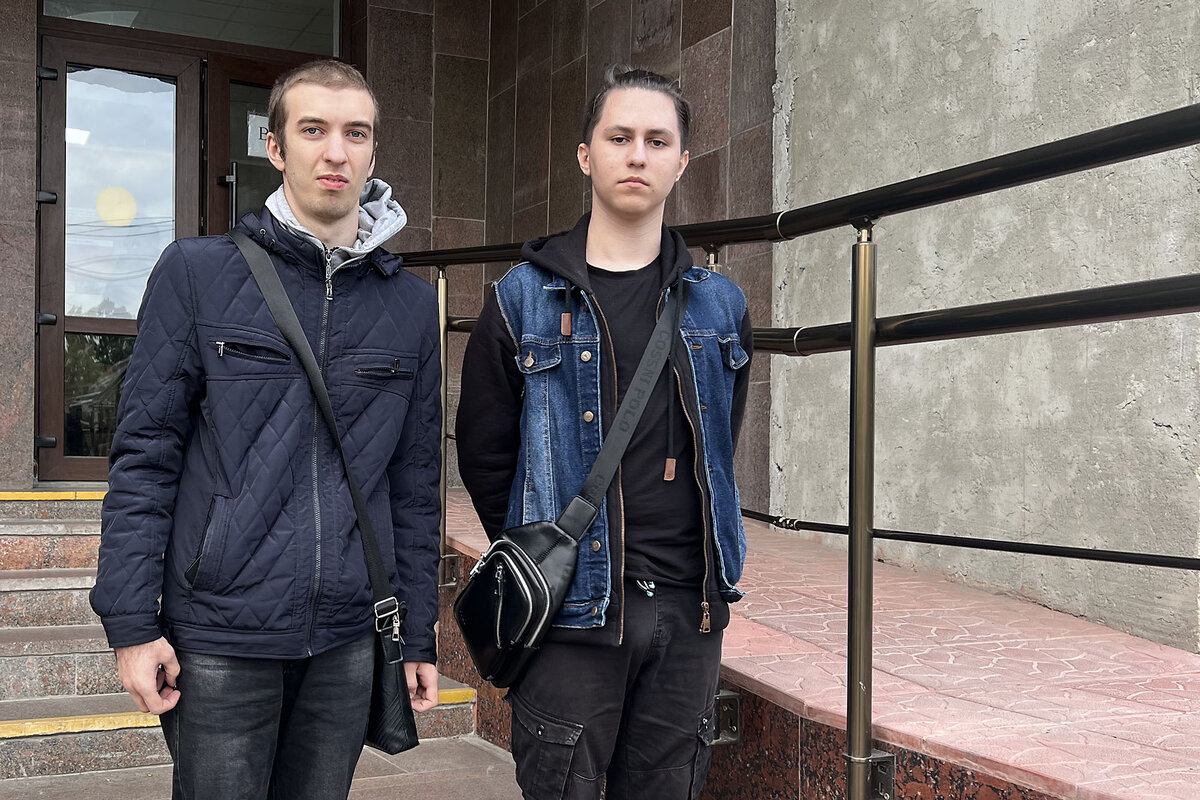
Yet even as more war-weary Ukrainians appear ready to accept ceding territory, many remain adamant that what is at stake is not just some eastern provinces bordering Russia, but Ukraine’s existence as an independent nation.
Indeed, the notion remains strong that Ukraine’s acquiescence to Russia on the territorial issue would send a devastating signal around the world that force prevails over the rule of law.
“False promise”
For many Ukrainians, their country’s long history with the Russian Empire, the Soviet Union, and now Mr. Putin’s Russia, offers proof that no deal involving Russian-occupied territory will satisfy Mr. Putin’s real goal: reconstituting the former USSR.
“With this war, we are talking about two very different things, either an independent Ukraine that sets its own course and decides its own future, or Ukraine as part of Russia,” says Anastasiia Khmel, dean of the faculty of political sciences at Black Sea National University.
As a result, “We have come to the conclusion that part of our territory would not be enough, [that] just the occupied lands would never guarantee peace,” she says.
Explaining why “land for peace” is a “false promise,” Professor Khmel says Russia’s real goal – as she says Mr. Putin has made clear – is complete domination of Ukraine. And that, she adds, means more than just territorial control, but “repression of Ukrainian identity and Ukrainian culture as it has occurred throughout the past 300 years” of Russian imperialism.
Others agree that ceding land would mean much more than a smaller Ukraine.
“In Russia they don’t have a normal conception of national borders; they are thinking in terms of what were the borders of the Soviet Union,” says Mykhailo Ziatin, a Mykolaiv poet and mathematician who has joined a nearby military unit to help repel the invading forces. “That means Russia is not a normal entity you can negotiate with, but an aggressor who would see a land deal as a step and not an end.”
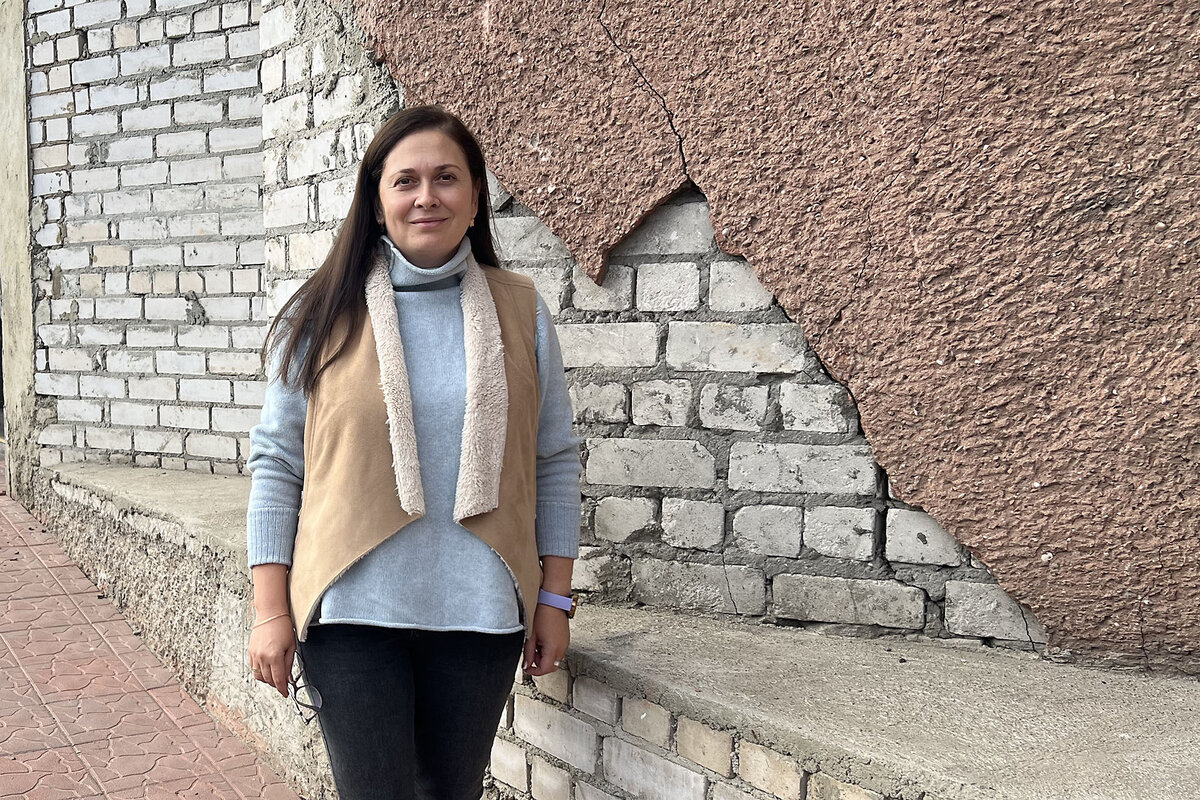
And there is another dimension to the land issue that Ukraine is confronting, not just for itself, Mr. Ziatin says.
“We Ukrainians don’t want to give up the lands we are responsible for to evil; we are taking a stand that force is not right,” he says. “That is a conviction that should matter to our Western neighbors and to the world.”
For the Western democracies that support Ukraine, Mr. Ziatin says, the question is “Are you OK with rewarding the monster who wishes to make our democracy impossible; do we really want to give up anything to that beast?”
Distrust of “guarantees”
That Ukrainians do not trust Mr. Putin to abide by any settlement for very long is hardly news, given how he has been seizing Ukrainian territory since 2014.
More surprising perhaps is their deep mistrust of any “security guarantees” they anticipate Ukraine’s Western partners would offer as part of a “land for peace” deal.
“We already learned the hard way that any deal based on vague security assurances comes with no means to enforce it, and that is the definition of a bad deal,” says Yevhen Hlibovytsky, director of Frontier Institute, a Kyiv think tank. “If Russia is rewarded now for its bad behavior, why should it not return to that bad behavior in the future?”
As many Ukrainians are wont to do, Mr. Hlibovytsky refers to the 1994 Budapest Memorandum, under which a newly independent Ukraine gave up the world’s third-largest nuclear arsenal in exchange for assurances from world powers, including Russia, that the “inviolability” of its borders would be respected.
The Budapest Memorandum “obviously didn’t work,” Mr. Hlibovytsky notes, leading him to foresee dire global consequences if Ukraine is forced into another accord now.
“If Ukraine has to cede territory in exchange for another set of vague security assurances,” he says, “that’s an invitation to broader nuclear proliferation around the globe.”
Mr. Hlibovytsky says average Ukrainians carry in their hearts the same basic convictions about the rules for achieving international peace.
“People on the street will tell you the same thing, just with more four-letter words than a smooth-talking academic uses,” he says. “They sense that Ukraine is something like a test for what rules and order govern the world going forward.”
“If the West is not committed to what it has said are its own standards and values,” he adds, “then they feel they have been fooled, and Ukraine is being betrayed.”

News Briefs
Today’s news briefs
-
Matt Gaetz out of running: The Republican congressman withdraws as President-elect Donald Trump’s pick for attorney general following continued scrutiny over a federal sex trafficking investigation.
- Related Monitor story: Mr. Gaetz’s withdrawal marks the first major setback for the incoming president and a sign that there are still lines that Senate Republicans won’t cross. Cameron Joseph reports.
- Jobless claims drop: The number of Americans applying for unemployment benefits fell again last week, remaining near seven-month lows. The number of Americans still collecting jobless benefits rose, however, for the week of Nov. 9.
- Speaker sets bathroom rule: House Speaker Mike Johnson declares that lawmakers and staff will have to use the restroom corresponding with their biological sex. Sarah McBride, the first transgender person elected to Congress, arrives soon on Capitol Hill.
- Storm hits U.S. Pacific Northwest: Rain and snow are pummeling the region amid the effects of a bomb cyclone.

Amid Gaza food shortages, ICC issues arrest warrant for Netanyahu
With tens of thousands of Palestinians in Gaza on the brink of starvation, the International Criminal Court has issued arrest warrants against Israeli Prime Minister Benjamin Netanyahu and his former defense minister for “impeding humanitarian aid.” Meanwhile, other obstacles to aid also block its distribution.

- Quick Read
- Deep Read ( 5 Min. )
-
Ghada Abdulfattah Special contributor
As the International Criminal Court issued arrest warrants for Israeli Prime Minister Benjamin Netanyahu and former Defense Minister Yoav Gallant for allegedly depriving Gaza’s civilians of “objects indispensable to their survival” and “impeding humanitarian aid,” residents of the Gaza Strip were still having difficulty finding food and aid.
The reasons aid does not reach families in Gaza are many and complex: Israeli restrictions, a small group of monopolistic merchants who hoard aid, and the emergence of organized gangs of armed looters.
Hamas has formed a task force to crack down on looting. Israel has opened a new crossing adjacent to central Gaza.
But aid has yet to trickle down to Palestinians in Gaza, who face shortages of everything from eggs to canned beans. Even dates have disappeared from the market in central Gaza, the heart of Gaza’s date industry.
“We lost a great deal of weight during the war, but we’ve lost even more these days,” says Sabha Abu Khousa, whose family has not received flour aid since the spring. “No one feels full.”
Mother Iman Shalat, whose pantry is empty, races from tent to tent asking her neighbors for flour to “borrow,” promising she will pay them back. None have any to spare.
Amid Gaza food shortages, ICC issues arrest warrant for Netanyahu

As aid trickled into hunger-stricken Gaza, limited by Israeli restrictions and local armed looters, the International Criminal Court (ICC) issued arrest warrants for Israeli Prime Minister Benjamin Netanyahu and his former defense minister Thursday for what it described as depriving civilians in Gaza of items “indispensable to their survival.”
The ICC issued warrants for Mr. Netanyahu, former Israeli Defense Minister Yoav Gallant, and Hamas military leader Mohammed Deif for war crimes and crimes against humanity committed during the Oct. 7 attack and the resulting Israel-Hamas war. Mr. Deif is believed to have been killed.
In its decision, the three-judge panel said of Mr. Netanyahu and Mr. Gallant, “There are reasonable grounds to believe that both individuals intentionally and knowingly deprived the civilian population in Gaza of objects indispensable to their survival, including food, water, and medicine and medical supplies, as well as fuel and electricity, from at least 8 October 2023 to 20 May 2024.”
The court said its warrants are “based on the role of Mr. Netanyahu and Mr. Gallant in impeding humanitarian aid in violation of international humanitarian law and their failure to facilitate relief.”
And yet, despite a 30-day deadline set by the Biden administration for Israel to increase humanitarian aid into starvation-struck Gaza, trucks carrying food, fuel, and sanitation items are still few and far between in the Gaza Strip.
The number of aid trucks entering Gaza dropped from 3,352 in August to 1,298 last month – less than 10% of prewar levels. Only a handful of trucks reached besieged northern Gaza, where Israel has stepped up military operations against a Hamas guerrilla insurgency.
Earrings for flour
Shortages have left hundreds of thousands of Palestinians in Gaza to scour their neighborhoods for disappearing food items.
Many, like Iman Shalat, are facing desperate choices.
“I had to sell my last pair of earrings to buy flour for my children,” Ms. Shalat says. But that flour has run out, so she goes from tent to tent in the makeshift camp where she lives, asking her neighbors if she can “borrow” some.
Then she tells her eldest son, Anas, who is 13 years old, to run to one of the few charity kitchens still operating.
“Go check if the tikiyya [charity kitchen] is handing out food,” she tells him. Anas and his 11-year-old sister grab an old food can with a twisted wire handle – a makeshift pail – to carry food and soups ladled out by the charity kitchen. “Hurry, before the food is all gone.”

Anas runs off in hopes of bringing back a warm meal. But he soon returns empty-handed, the large tin can swinging, empty.
The aid shortfalls have stripped markets of goods and customers. In the Deir al-Balah market, once a hub where food and aid packages were always available, if expensive, only a few stalls now sell a few vegetables, including spinach, tomatoes, and bell peppers grown in the yards of houses that are still standing.
Vendor Jaser Sarsour senses the rising desperation.
As soon as he sets his vegetables out, customers rush his stall. “They beg me for one tomato, one cucumber, or one eggplant,” he says.
Chicken, meat, eggs, and milk are gone from the market. That forced people to rely on canned goods such as fava beans for protein – until beans too disappeared from the market last week.
The prices of what little food can be found are skyrocketing: One bag of 18 pita loaves sells for $12.06, more than 10 times its prewar price. A kilogram of sugar costs nearly $20.
Gazans blame Israel and local merchants
Residents attribute the price hikes to two main causes: the closure of border crossings by Israeli soldiers, and the tight grip that a handful of merchants have on the market.
Palestinian community leaders have shut down local markets in general strikes to denounce what they describe as merchant monopolies. Young people in central and southern Gaza began holding market sit-ins this month.
“Down with the greed of merchants,” they shouted in a recent protest, venting the collective frustration of a community grappling with hunger and scarcity.
In recent weeks, armed gangs, described by locals as “highwaymen,” have sprung up. They hijack and sack aid convoys entering the southern Gaza Strip from Israel through the Kerem Shalom crossing.
Under pressure to crack down on thefts and in the face of growing protests, the Hamas authorities say they have allied with other Palestinian factions to confront the looters.

The new force is focusing on an area near the Kerem Shalom crossing, where last weekend saw one of the largest aid heists since the war began: Ninety-eight out of 109 trucks carrying United Nations food aid were ransacked by armed men Saturday evening.
Two days later, Hamas policemen killed 20 gang members accused of stealing humanitarian aid, according to the Gaza Interior Ministry.
The Hamas-run ministry described the bust as “the beginning of a broad security campaign that has been long planned and will expand to include everyone involved in the theft of aid trucks,” vowing the operation “will not be the last.”
Internal U.N. memos reported by The Washington Post, and local residents, blame Israeli forces for not cracking down on organized looters, even accusing them of being complicit. Local people noted that Saturday’s heist took place in an Israeli-controlled closed military area where civilians and Hamas police forces cannot go.
New border crossings, more aid?
In a move the Israeli authorities described as a bid to increase aid supplies, a new border crossing was opened last week. Israel also coordinated with the Jordanian air force to deliver 7,000 kilograms (about 15,000 pounds) of food and sanitation supplies via helicopter to the new crossing on Wednesday. On Thursday Jordan announced that 100 trucks entered Gaza through the West Bank and Israel.
But the anti-gang operations and the new crossing point are doing little, so far, to help Gaza residents such as Sabha Abu Khousa.
Like many displaced Gaza residents, she and her family last received a sack of flour at the Ramadan feast, in spring.
“It’s all gone now,” Ms. Abu Khousa says.
“We depend on tikiyya for food. If there is no tikiyya, we rely on canned food. If there is no canned food, we rely on dukkah,” a blend of spices, grains, legumes, and nuts. “We used to dip it in olive oil, but now we can’t even afford that.”
“We lost a great deal of weight during the war, but we’ve lost even more these days,” she says. “No one feels full.”

Can Trump bypass the Senate to ram through controversial nominees?
The U.S. Senate has always voted on whether to confirm a president’s nominees for major posts. It’s a key check on presidential power. President-elect Donald Trump’s allies think they may have a work-around.

- Quick Read
- Deep Read ( 7 Min. )
-
Henry Gass Staff writer
As the Senate grapples with whether to confirm some of President-elect Donald Trump’s most controversial Cabinet selections, the question isn’t just whether they’ll have enough votes to be confirmed – but if those votes will happen at all.
Mr. Trump has repeatedly pressured Senate Republicans to let him make recess appointments if his choices can’t get through the chamber, which will have a narrow Republican majority come January.
Some of Mr. Trump’s allies are arguing that an obscure clause of the Constitution could empower him to force the Senate to go out of session – without senators’ consent – in order to ram through his most polarizing picks for top offices.
That could let him put his most controversial nominees at the head of powerful agencies – like Tulsi Gabbard for director of national intelligence or Robert F. Kennedy Jr. for secretary of health and human services – without any say from senators.
Some Senate Republicans have downplayed the prospect.
“The traditional process will work – and we need to do it fast,” said South Carolina Sen. Lindsey Graham.
Outgoing Senate Minority Leader Mitch McConnell reportedly signaled his opposition to recess appointments at a private event, though at a Tuesday press conference he disputed “rumors” that he’d made those comments.
Can Trump bypass the Senate to ram through controversial nominees?
As the Senate grapples with whether to confirm some of President-elect Donald Trump’s most controversial Cabinet selections, the question isn’t just whether they’ll have enough votes to be confirmed – but if those votes will happen at all.
Mr. Trump has repeatedly pressured Senate Republicans to let him make recess appointments if his choices can’t get through the chamber, which will have a narrow Republican majority when the new Congress convenes in January.
Some of Mr. Trump’s allies are arguing that an obscure, never-used clause of the U.S. Constitution could empower him to force the Senate to go out of session – without senators’ consent – in order to ram through his most polarizing picks for top offices.
The basis for this claim is a particular interpretation of Article II, Section 3 of the U.S. Constitution, which says if the Senate and House can’t agree on the time period for adjournment, the president “may adjourn them to such Time as he shall think proper.”
The question is whether Mr. Trump could utilize this language by getting the Republican-controlled House to vote to recess, then rule to adjourn Congress if the Senate doesn’t agree. That could let him put his most controversial nominees at the head of powerful agencies – like Tulsi Gabbard for director of national intelligence or Robert F. Kennedy, Jr., for secretary of Health and Human Services – without any say from senators.
Matt Gaetz's decision to withdraw from consideration for attorney general in the face of Senate opposition shows that the confirmation process is a real obstacle – and one that Mr. Trump could grow more frustrated with in the coming months.
House Speaker Mike Johnson has indicated he may be open to recess appointments. In a Sunday interview on Fox News, Speaker Johnson said that he is “sympathetic” to arguments that the move might be necessary if some of Mr. Trump’s nominees face roadblocks to confirmation in the Senate.
“I wish the Senate would simply do its job of advise and consent, and allow the president to put the persons in his Cabinet of his choosing. But if this thing bogs down, it would be a great detriment to the country, to the American people,” Speaker Johnson said. “We’ll evaluate all that at the appropriate time, and we’ll make the appropriate decision.”
Speaker Johnson can’t unilaterally declare the House in recess – it takes a floor vote. And given how narrowly divided the House will be in the next session, defections from just a handful of moderate Republicans could block the effort.
It’s also unclear whether the House could force the issue if the Senate simply ignores the House’s vote to recess. Any attempt at this maneuver is almost certain to be challenged in court.
Still, if it’s attempted, experts say the country would be entering uncharted waters. No president in U.S. history has tried this before. It would be a dramatic change in how government operates, essentially removing a crucial part of the checks-and-balances system created by the Founding Fathers.
“No one really knows what the limits of this clause are, because it’s never been used,” says Matthew Glassman, a senior fellow at the Government Affairs Institute at Georgetown University and former longtime staffer at the Congressional Research Service.
And this potential scheme could be a sledgehammer, not a scalpel. If Mr. Trump gets a congressional recess, he could appoint whomever he wants to whatever roles he wants – potentially moving hundreds of nominees, with no say from Congress.
“I certainly would take it seriously. It is unclear to what extent the Republican leaders of the House and Senate are willing to abdicate their constitutional responsibilities and become a factotum of Trump. If they acquiesce to this it would be changing our political system from separation of powers to more of a parliament,” said Daniel Schuman, executive director of the American Governance Institute, a nonpartisan government modernization and transparency organization. “I’m really alarmed about this.”
Some conservative legal scholars are sounding alarms as well. Edward Whelan, a senior fellow of the Ethics and Public Policy Center, has written multiple op-eds in recent days warning Republicans against going along with what he described as a “cockamamie scheme” that would undermine a “fundamental feature of the Constitution’s system of checks and balances.”
How Republican senators are responding
Many Senate Republicans say they want to avoid this scenario – but also seem happy to have the threat of recess appointments hanging over the process as a way to pressure fellow lawmakers – both Democrats and Republicans – who are wary of specific Trump nominations. Incoming Senate Majority Leader John Thune told reporters last week that “all options are on the table, including recess appointments,” to circumvent resistance to Trump appointments.

“The Constitution gives the president the ability to adjourn the houses,” Republican Sen. Josh Hawley of Missouri, a Trump ally, told the Monitor this week. He added that it’s “never been done” and the procedure is “a little unclear,” before offering a warning to his Democratic colleagues: “Don’t gum up the confirmation process.”
Senator Hawley said that he hoped that the threat of recess appointments could pressure his colleagues on both sides of the aisle to allow the Senate to move fast on voting on the president’s appointments.
“I hope it’ll convince them, yes, to move these nominations. If you want to vote no, go ahead and vote no. But let’s don’t jam this up such that we’re not able to confirm,” he said.
Other Senate Republicans downplayed the likelihood of recess appointments.
“If you went and talked to a lot of the people that are being put forth for Cabinet-level positions, they don’t want to go down that route. It’s not going to happen that way,” said North Carolina Sen. Thom Tillis.
“The traditional process will work – and we need to do it fast,” South Carolina Sen. Lindsey Graham said when asked about recess appointments.
Outgoing Senate Minority Leader Mitch McConnell reportedly signaled his opposition to recess appointments at a private event last weekend, though at a Tuesday press conference he disputed the “rumors” that he’d made those comments. While he declined to directly say whether he thought Mr. Trump could force the Senate into recess, he indicated he saw the Senate’s advise-and-consent role as important.
“I’m confident that we’ll engage the same kind of vetting process that we have historically done under both parties with these nominees,” he said.
Where the Supreme Court might land
This isn’t the first time recess appointments have generated controversy. Presidents of both parties have taken advantage of congressional recesses to push through picks that were mired in slow confirmation processes or that faced uphill battles. Over time, Senate leaders responded by simply refusing to officially go on recess, instead entering “pro forma” sessions where no work was being done but the Senate wasn’t technically out on recess.
Things came to a head in 2012, when then-President Barack Obama claimed the Senate actually was in recess and tried to appoint a trio of members to the National Labor Relations Board. The fight went to the U.S. Supreme Court, which ruled unanimously in 2014 that the nominations that President Obama made during that three-day pro forma session were invalid. The court ruled that for a period to be considered an official “recess,” it must be at least 10 days long.
Three conservative justices who decided that case remain on the court today – Chief Justice John Roberts, Justice Clarence Thomas, and Justice Samuel Alito – and all three joined a concurring opinion from Justice Antonin Scalia that advanced an even narrower view of the president’s recess appointment power. The Founders viewed the Senate’s role in the appointment process “as a critical protection against ‘despotism,’” Justice Scalia wrote. He called the recess appointments language in the Constitution an “anachronism” from the horse-and-buggy era when it could take weeks or months to convene Congress. Even allowing recess appointments during – not just between – congressional terms “will have the effect of aggrandizing the Presidency beyond its constitutional bounds,” he wrote.
It’s unclear whether these Republican-appointed justices’ views will hold firm, or shift with a Republican in the White House.
Since that ruling a decade ago, Congress has refused to go into recess, preventing presidents of both parties from making recess appointments.
Other Senate work-arounds
During his first term in office, President Trump took advantage of another relatively obscure law to put several allies into key positions without subjecting them to Senate confirmation.
He used the Vacancy Act, which allows the president to temporarily appoint anyone who had already been confirmed to any position by the Senate for other roles that would normally require Senate approval. It enabled Mr. Trump to fill some top posts – including attorney general, secretary of Defense, Department of Homeland Security secretary, and head of U.S. Immigration and Customs Enforcement – with controversial selections that may not have been able to get through the Senate.
Traditionally, that law had been used to fill roles with placeholder appointees while nominations worked their way through the Senate’s glacial confirmation process – or let nominees start working on an acting basis while they waited on the Senate. But for some key positions, Mr. Trump opted to just appoint his favored candidates in an “acting” status, permanently.
That was a significant departure from previous administrations. But it pales in comparison to what Mr. Trump and his allies are now considering.
Staff writer Henry Gass reported from Austin, Texas.
Editor’s note: This story was updated Nov. 21, the day of original publication, to reflect news developments.

Patterns
It’s more than money dividing nations at UN climate conference
Delegates to the COP29 climate conference in Azerbaijan are finding it difficult to agree on how much money poor countries need to deal with climate change. That’s partly because some leading countries appear not to believe any longer in shared global climate action.

- Quick Read
- Deep Read ( 4 Min. )
This year’s COP climate summit is having difficulty deciding how much money rich countries should stump up to help developing countries cope with the effects of global warming. But delegates face an even bigger challenge – to the very idea of shared global climate action, as it was laid out in the 2015 Paris Agreement.
In the new mood of climate nationalism, key carbon dioxide emitters such as India, China, and the United States seem to be set on charting their own course.
Is the fabric of international cooperation resilient enough to forestall the irreversible symptoms of an overheating planet?
The short term looks dark. U.S. President-elect Donald Trump pulled Washington out of the Paris Agreement in his first term, and seems likely to do the same this time, boosting oil production to boot.
But further down the road, the outlook may be less discouraging.
More and more governments and major corporations are shifting investment to green projects. And, more importantly, China has launched a huge wave of investment in green energy sources and other environmentally responsible technology. Beijing’s goal is clearly to be the leading global player in a postcarbon world economy.
Might that prospect perhaps goad Mr. Trump into putting “America First” in this domain, too?
It’s more than money dividing nations at UN climate conference

The conference held this week in Baku, the capital of Azerbaijan, has been the very definition of international diplomacy. Delegates from nearly 200 countries have been addressing the perils of climate change and trying to find the huge sums of money needed to slow, and cope with, its damaging effects across the planet.
Yet even as COP29, the annual United Nations climate conference, sought to produce a new, multi-trillion-dollar “climate finance” plan, there were growing signs of an even greater challenge – to the very idea of shared global climate action embodied in the Paris Agreement of 2015.
It might be called “climate nationalism.”
A number of key countries – including China, the United States, and India, the main sources of the carbon dioxide fueling global warming – seem increasingly set on charting their own course.
America and China, the world’s largest economies and major political powers, are central to any workable international climate agreement. While their rivalry has intensified in recent years, they were both key to making the landmark Paris accord possible.
The question now is whether the post-Paris fabric of international climate cooperation is still resilient enough to forestall the irreversible symptoms of an overheating planet.
That has become increasingly urgent amid expert warnings that the fight against climate change is at a crossroads moment, as the scale of global warming intensifies.
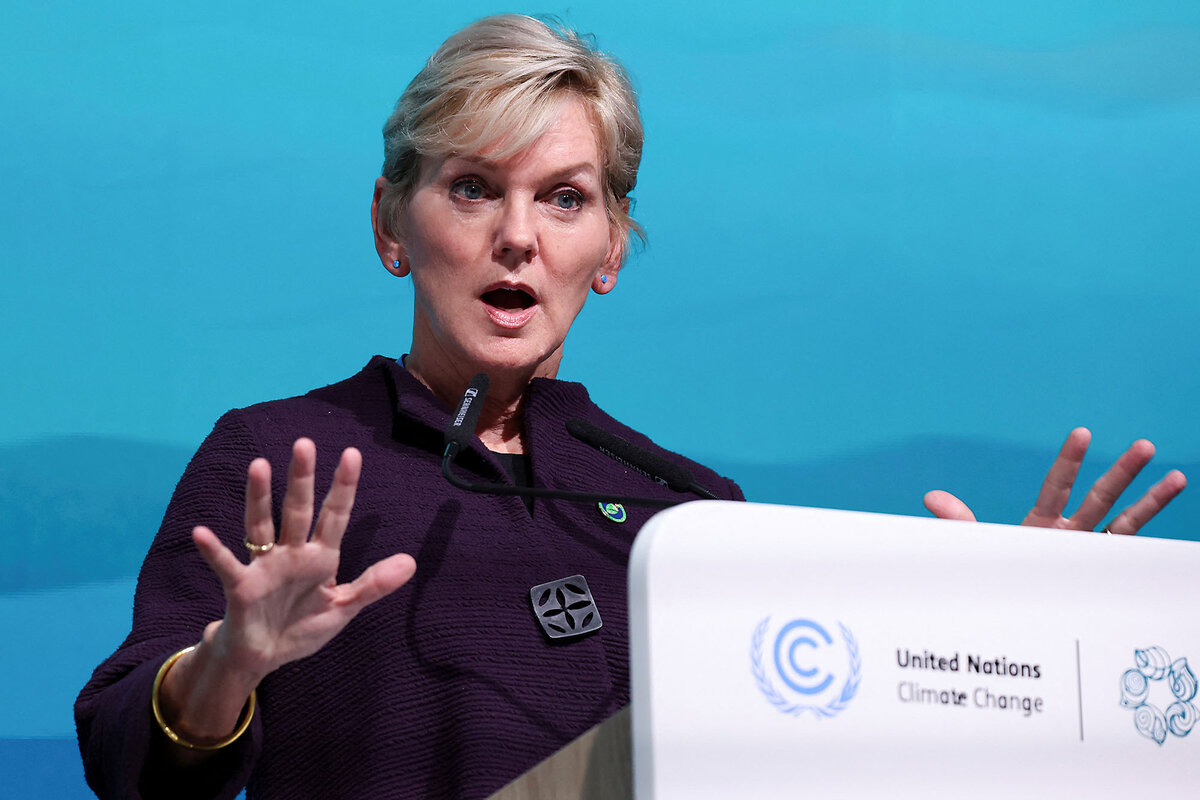
The answer is not encouraging in the short term.
But for a variety of economic and geopolitical reasons, the outlook is not necessarily so bleak further into the future.
The main short-term challenge is likely to be U.S. President-elect Donald Trump’s return to the White House.
During his first term, he withdrew the United States from the Paris Agreement, and a spokesman during his election campaign said he would do so again. He has also vowed to expand U.S. oil production, already at a record high, telling campaign rallies he would “drill, baby, drill!”
An early, real-world test of what Trump 2.0 will mean could be the next administration’s response to the climate-finance framework that delegates have been trying to thrash out in Baku.
Even with energetic U.S. and Chinese engagement – and neither government sent top-level delegations to COP29 – reaching an agreement that stands a chance of implementation was always going to be difficult.
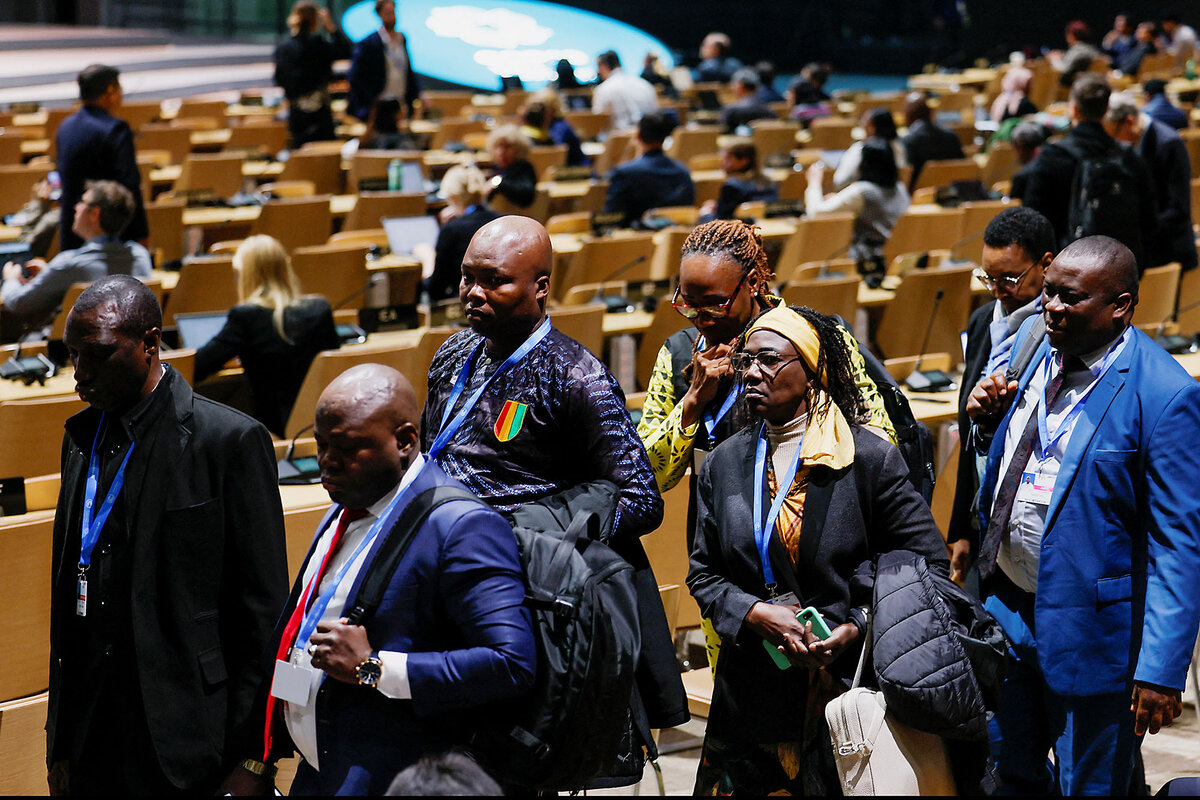
The aim? To secure enough money for less developed economies, and those already vulnerable to the effects of rising sea levels, extreme storms, rainfall, and droughts, to cope with these effects and develop their own economies on a low-carbon footing.
At an early COP meeting in 2009, the United States, European countries, and other developed economies undertook to provide an annual sum of at least $100 billion by 2020 – a benchmark they finally met only in 2022.
And now the amounts required are enormously higher. The United Nations has said around $1.3 trillion a year is needed, a figure it predicts will rise to between $6.3 trillion and $6.7 trillion by 2030.
That has led to fraught discussions in Azerbaijan over how the target might be met, in a mixture of grants, private investment, and contributions from international financial institutions.
The debate has also revived longstanding frustrations among developed countries over the criteria governing the way economies are classified, which defines economic heavyweights such as India, the Gulf oil states and, above all, China, as still part of the developing world, and thus not required to contribute to the central climate funds.
Even if the Azerbaijan conference does agree on a draft for a new, much larger climate-finance fund, it is hard to see how it will get buy-in from Chinese leader Xi Jinping and Mr. Trump – which would be essential – anytime soon.
Still, the longer-term outlook may prove less discouraging.
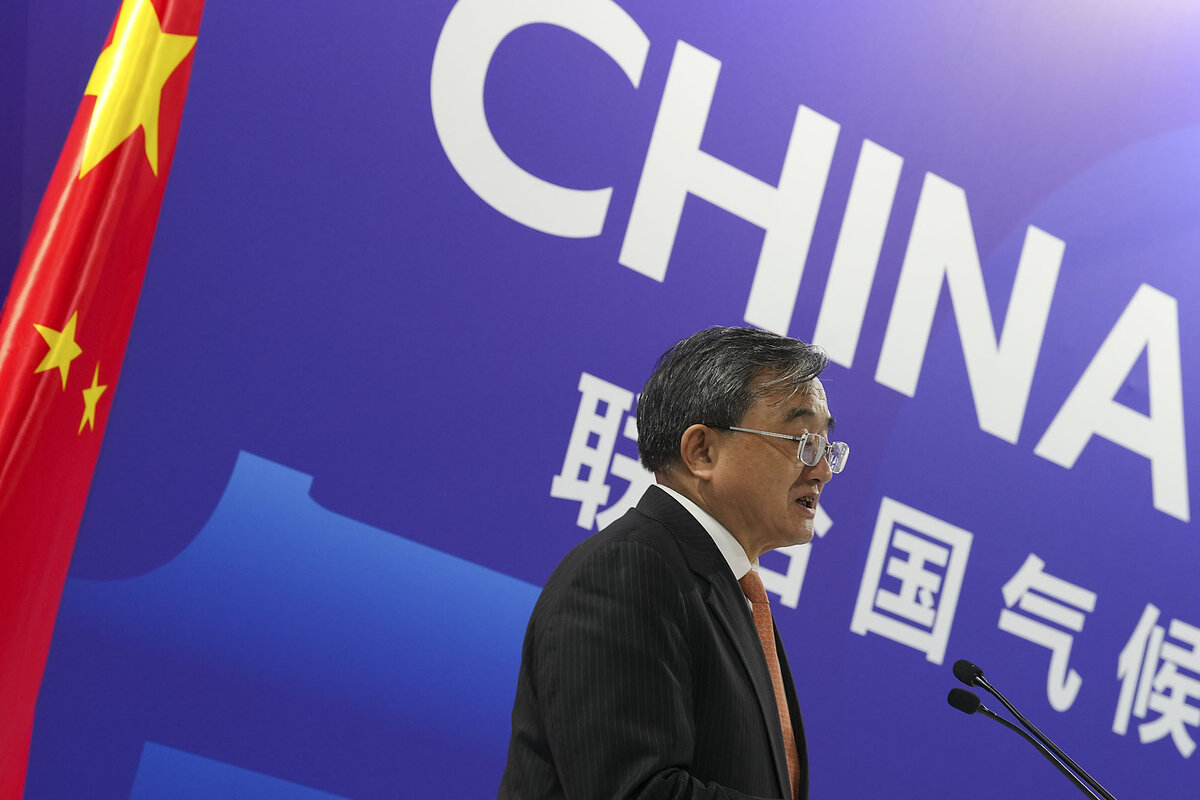
One reason is that more and more governments and major businesses are shifting towards investments in green projects. For instance, top executives in U.S. oil and natural gas companies have been urging Mr. Trump to remain in the Paris process.
More importantly, China has begun huge-scale investment in greener energy and technology, with the clear intention of becoming the leading player in a post-carbon world economy. Beijing now generates nearly half its energy from renewables, which have overtaken coal.
Another sign of the economic retooling is electric cars. Last year, 60% of the world’s new electric vehicles were registered in China. Exports of those vehicles threaten to undermine Western car-makers’ share of their own markets.
So climate nationalism might provide a longer-term boost to the world’s move away from fossil fuels.
President-elect Donald Trump’s foreign policy North Star has been “get tough on China.” He has vowed to place new and higher tariffs on Chinese imports, electric cars presumably among them.
And while he has signaled his opposition to President Joe Biden’s “green new deal” infrastructure investments, he may prove reluctant to undo a program that has disproportionately benefited Republican-led areas of the country.
On top of that, if Beijing plans to make itself the world’s leading nation by dominating a greener world economy, perhaps Mr. Trump may be tempted to challenge China’s ambitions in that field.
Might he want to put “America First” in a green future as well?

Loggers were stealing the forest. These women started stealing their chain saws.
Nigeria, like much of the world, is losing its trees at a rapid rate. For one group of women here, enough was enough.

- Quick Read
- Deep Read ( 5 Min. )
-
By Saint Ekpali Contributor
Globally, the world’s forests are receding at a rapid clip, with more than 40,000 square miles disappearing annually, according to the United Nations.
Nigeria is on the front lines of this crisis. The country has lost 13% of its tree cover since the year 2000, according to Global Forest Watch, which tracks deforestation around the world. In Nigeria’s southern Cross River state, that loss is particularly consequential. With the state being home to half of Nigeria’s rainforest, communities there have long relied on the forests for their survival.
That’s why, in 2018, a group of women in the village of Olum decided to form an informal forest policing squad to save its trees from being chopped up and carried away. Armed with machetes, hoes, and the authority to name and shame locals who participate in illegal logging, they have helped vastly reduce the practice here, according to local authorities and environmental activists.
Because illegal logging is so lucrative, men in the community might have allowed it to continue, says Fredaline Akandu, the king, or paramount ruler, of the Boki district. “But women don’t tolerate it.”
Loggers were stealing the forest. These women started stealing their chain saws.
The forest had given Doris Ofre everything.
When she was growing up in southern Nigeria, it was her family’s supermarket, pharmacy, and ATM. If her mother needed cash for her school books, she sold oranges and mangoes she picked in the forest. If they wanted adventure, Ms. Ofre and her friends played hide-and-seek beneath the tree canopy, and tossed bananas to the monkeys hanging in the branches.
So when the forest that had given her so much was threatened by illegal loggers, Ms. Ofre didn’t hesitate.
She picked up her machete, and with 20 other women, marched toward the scene of the crime.
Globally, the world’s forests are receding at a rapid clip, with more than 40,000 square miles disappearing annually, according to the United Nations. Nigeria is on the front lines of this crisis. The country has lost 13% of its tree cover since the year 2000, according to Global Forest Watch, which tracks deforestation around the world. In Cross River state, where Ms. Ofre lives, that loss is particularly consequential. With the state being home to half of Nigeria’s rainforest, communities there have long relied on the forests for their survival.
That’s why, in 2018, Ms. Ofre, who is a farmer, and five other women in Olum decided to form an informal forest policing squad to stop their forests from being chopped up and carried away. Armed with machetes, hoes, and the authority to name and shame locals who participate in illegal logging, they have helped vastly reduce the practice here, according to local authorities and environmental activists.
Because illegal logging is so lucrative, men in the community might have allowed it to continue, says Fredaline Akandu, the king, or paramount ruler, of the Boki district. “But women don’t tolerate it.”
The scramble for Boki’s trees
Ms. Ofre’s connection to the forest began early in life. She grew up in Olum, a farming village carved into the mountainous rainforest near Nigeria’s southeastern border with Cameroon. As a child in the 1960s and ’70s, she says, she was taught that the forest was her community’s wealth. The forest was where her family and neighbors went to cut down wood for their houses, taking only as much as they needed. Women collected vegetables there to cook with and sell.

However, beginning in the 1980s, Ms. Ofre began to notice the trees disappearing. It started with the growl of chain saws. Then huge trucks would appear at the edge of the forest. They arrived empty, but left loaded down with wood. Usually, the men cutting down the trees were locals working for outside companies. Occasionally, Ms. Ofre even saw people she knew personally.
Soon, they noticed other changes. Foraging for once-abundant wild mushrooms became a treasure hunt. The monkey population dwindled so much that when Ms. Ofre’s children were growing up in the 1990s, she had to take them to a nearby monkey sanctuary to see the animals at all.
The 16 villages surrounding the forest weren’t the only ones that recognized the problem. In May 2000, the state government established the Afi Mountain Wildlife Sanctuary in Ms. Ofre’s backyard. The reserve was meant to provide protection to the region’s several endangered species, including the Cross River gorilla, one of the world’s rarest great apes. It also prohibited logging anywhere in the park grounds.
But the carving up of the forest continued. Now, increasingly, Ms. Ofre saw Chinese loggers, who seemed to particularly like a swirl-patterned amber wood called bubinga.
In July 2012, the consequences of this scramble for Boki’s trees were laid bare when a landslide tore through Buanchor, one of the villages bordering Afi Mountain. It flattened houses and the local secondary school. The soil had become loose and exposed because of the logging, says Peter Bette, a local environmentalist. “It is possible we wouldn’t have had the landslide should the felling of trees not [have happened].”

Finally, Ms. Ofre and other women in the community could take no more. In 2018, a small group that included Ms. Ofre and local Queen Faith Akandu formed the Women Association of Afi Mountain Wildlife Sanctuary to fight back. They joined a growing cadre of community and conservation groups patrolling the forest. Some were searching for poachers, others wildfires.
But the Women Association was the first to specifically target illegal loggers.
Caught in the act
It began to scour the forest for felled trees and other traces the loggers left behind, which they reported to local authorities. Sometimes, though, the women happened to catch perpetrators in the act.
One day in May 2020, for instance, Ms. Ofre says she was home at her farm when she heard a chain saw roar to life in the distance. She and her colleagues followed the sound to its source: a local man cutting down a large tree. The women demanded he hand over his chain saw, and then they marched him to the king’s palace.
That kind of policing is possible in Olum because everyone knows everyone here, and families go back generations, locals say. That means if someone breaks the rules, they must either face the music or leave the community entirely.

“We see the Afi Mountain Wildlife Sanctuary as our oil. We don’t joke with it,” explains King Akandu, who is also a longtime environmental activist in the region. When the women bring him loggers, he warns or fines them, he says.
“The works of the women are effective, says Mr. Bette. “[In the past], anyone could jump into the forest to start cutting wood. But that has stopped in Olum and Buanchor.”
Now, the group is thinking bigger. It wants to expand its patrols to other communities around Afi Mountain, where it says many locals are cutting down trees themselves, and leaders have been bought off by logging companies. It’s tricky work, Ms. Ofre acknowledges. But she never thinks of giving up.
“We are protecting the remaining forest for our children so they will experience what we experienced,” she says. “I believe women always achieve their goals when they unite.”


Good is ‘the strongest gravity,’ says ‘Wicked’ author Maguire
Fairy tales often present characters as either good or bad. “Wicked” author Gregory Maguire asks readers to let go of binary thinking as they consider morality.

- Quick Read
- Deep Read ( 5 Min. )
The new big-screen musical “Wicked” expands the fantasy world of L. Frank Baum’s original books and the classic 1939 MGM movie adaptation starring Judy Garland. It also subverts them.
“Wicked,” based on a 1995 novel, challenges our conceived notions of Baum’s characters. It explores the nature of evil through the complex friendship between Glinda, the Good Witch, and Elphaba, the Wicked Witch.
Gregory Maguire, the author of “Wicked: The Life and Times of the Wicked Witch of the West,” describes the story as “almost like a morality play.” A global phenomenon, “Wicked” ranks as Broadway’s second-highest grossing production after “The Lion King.” The first installment of the movie adaptation arrives in cinemas on Friday.
“The play manages to make wanting to be good, wanting to do good, into a theatrical gesture that everybody in the audience can recognize and can remember,” says Mr. Maguire.
Discerning the dividing line between good and evil isn’t always easy.
“It is a conundrum with which we have to live,” he says. But, he adds, we can’t stop asking ourselves that question. Avoiding doing so risks “taking the easy way out and taking early retirement from our job of being moral agents in the universe.”
Good is ‘the strongest gravity,’ says ‘Wicked’ author Maguire
“Wicked,” the retelling of “The Wizard of Oz,” features familiar elements. There’s a yellow brick road, an Emerald City, and even a cameo by Dorothy and Toto. Plus show tunes.
The imminent big-screen musical expands the fantasy world of L. Frank Baum’s original books and the classic 1939 MGM movie adaptation starring Judy Garland. It also subverts them. “Wicked,” based on a 1995 novel, challenges our conceived notions of Baum’s characters. It explores the nature of evil through the complex friendship between Glinda, the Good Witch, and Elphaba, the Wicked Witch.
“Are people born wicked?” asks Glinda during the opening musical number. “Or do they have wickedness thrust upon them?”
Confronting those questions may be more terrifying than encountering Oz’s flying monkeys.
Gregory Maguire, the author of “Wicked: The Life and Times of the Wicked Witch of the West,” describes the story as “almost like a morality play.” The author, who invited the Monitor to visit his home, is sitting near a bookshelf that includes many of his works. To date, he’s published 38 titles. Some are children’s fantasy books. Others are adult reinterpretations of fairy tales such as “Cinderella” (“Confessions of an Ugly Stepsister”) and “Snow White” (“Mirror, Mirror”). His blockbuster “Wicked” was adapted as a Tony-winning musical in 2003. It’s been defying gravity ever since.

A global phenomenon, “Wicked” ranks as Broadway’s second-highest grossing production after “The Lion King.” The first installment of the movie adaptation, which has been split into two parts, arrives in cinemas Nov. 22. Meanwhile, Mr. Maguire is readying a spring release for his latest book, “Elphie: A Wicked Childhood.”
In common, these various iterations endure, Mr. Maguire says, because they speak to the innate instinct within each of us to be good.
“The play manages to make wanting to be good, wanting to do good, into a theatrical gesture that everybody in the audience can recognize and can remember,” says Mr. Maguire, his face aglow from a standing lamp in his wood-paneled living room. But, he adds, Western culture has become slightly embarrassed by this essential truth. “It goes along at the same rate with the secularization of [the United States] ... and the decline of church attendance. Anybody who talks about being good is ‘naff’ and is ‘simpleminded.’”
From a classic film, a morality play
When Mr. Maguire was a child, his four siblings called him “a moral savant.” In part, he attributes that to his Catholicism. He was taught that good is “the strongest gravity in the forward progress of time.” Mr. Maguire was raised in a strict, lower-middle-class household in Albany, New York. Reading was encouraged. Television was rationed. Every year, Mr. Maguire was allowed to watch “The Wizard of Oz.” Such was its powerful hold on his imagination that he dragooned his brothers and sisters into playing the Tin Man, Lion, Scarecrow, and Dorothy. But the boy’s reenactments didn’t always stick closely to the movie storyline, a precursor to the path he’d take as an adult. By the time Mr. Maguire began writing “Wicked,” he was an established children’s book author.
“I began to feel that some of the themes I wanted to explore were more complex,” says Mr. Maguire, who raised three adopted children with his husband. “It was a very easy jump for me to think, ‘If I want to write about the nature of evil, I’ll take an evil character in a children’s book, and begin to unpack her and see what it was that, even as a child, I could determine were deeper constructs of passion and conflict within that character than we generally pay attention to.’”
Mr. Maguire’s literary reimagining is for mature readers. Its depiction of debauchery in Oz isn’t prurient, but readers expecting something akin to Baum’s children’s books will quickly realize, “We’re not in Kansas anymore.”
The musical and movie versions of “Wicked” are more family-friendly. Yet they retain the thematic core of the novel. Last year, Mr. Maguire visited London’s Elstree Studios to observe filming of a key scene in the movie.

The two witches meet at university. Popular girl Galinda (Ariana Grande) is saddled with an unwanted roommate, Elphaba (Cynthia Erivo). The latter is a social outcast born with green skin and razor teeth. She also has an aversion to water. Galinda (later known as Glinda) hazes Elphaba. It’s “Mean Girls: Oz Edition.” But when Galinda sees the hurt behind her roommate’s stoic eyes, it arouses empathy within her.
“At least three times I had tears in my eyes,” says Mr. Maguire, who spent three days watching the actors. “The scenes where they were vulnerable, they had tears in their eyes.”
A fuller picture of a complicated witch
“Wicked” portrays Elphaba as a rounded human being. Her later deeds are the consequence of multiple factors and experiences rather than of one simple, reductive reason. (The upcoming “Elphie: A Wicked Childhood,” based on chapters jettisoned from the first draft of “Wicked,” delves deeper into the witch’s troubled upbringing.) The novel’s nuanced complexity avoids didacticism. The world is dominated by binary thinking, says Mr. Maguire. Everything is black or white. There’s no space in the middle.
“That’s definitely how a lot of us kind of get through the world as kids. It’s like, ‘OK, this is bad; this is good; this is right; this is wrong,’” says Emily Kay Shrader, co-host of “Down the Yellow Brick Pod,” a podcast about the world of Oz, including Mr. Maguire’s “genius” novels. “The most challenging thing about growing up is acknowledging that it’s such a spectrum. That whether it’s someone you meet on the street or it’s yourself, there’s really not a box that you can put anyone into.”
Ms. Shrader adds that it’s a good reminder to check herself whenever she meets someone who has a different political background from her.

“We have gotten more and more used to thinking we can’t tolerate something that doesn’t line up with our string of ones or a string of zeros,” agrees Mr. Maguire. “It’s true about how culture talks [about] itself to us.”
However, the novelist isn’t a moral relativist. After all, Elphaba becomes a terrorist to combat the nefarious wizard who rules Oz. “She is not the evil witch from MGM or L. Frank Baum,” he says. “But she’s not a saint either. She makes lots of mistakes, and she’s morally confused. She’s willing to cause harm to people if she can, and if she can do it in order to further what she considers as a good cause.”
Discerning the dividing line between good and evil isn’t always easy, the author says before he ushers his visitors on a tour of his “Wicked” memorabilia, ranging from figurines to umbrellas.
“It is a conundrum with which we have to live,” says Mr. Maguire. But, he adds, we can’t stop asking ourselves that question. Avoiding doing so risks “taking the easy way out and taking early retirement from our job of being moral agents in the universe.”
Other headline stories we’re watching
(Get live updates throughout the day.)The Monitor's View
A shield from war for Iraq
- Quick Read
- Deep Read ( 2 Min. )
-
By the Monitor's Editorial Board
In early November, one of the most revered spiritual leaders in the Middle East, the Shiite cleric Ayatollah Ali al-Sistani, issued a rare guidance to his home country, Iraq. It came soon after reports that neighboring Iran might use militias under its control in Iraq to rain missiles and drones on Israel.
His advice? That the Iraqi people, especially their “informed elites,” must exercise more “competence and integrity” in governance and improve the rule of law in fighting corruption. His most specific message, however, was that any arms in Iraq – notably those of the Iran-backed Islamic Resistance in Iraq – must be held exclusively under the authority of the elected government in Baghdad.
His guidance has echoed across Iraq, a country trying hard not to get caught up in a low-boil war of retaliatory attacks between Israel and Iran.
Mr. al-Sistani does not believe clerics should rule, as they do in Iran. In his Shiite-majority country, he sees his role as supporting the people to live up to their civic and religious ideals. Right now, during the crossfire of a violent conflict around them, Iraqis need the armor of integrity. Sometimes the best deterrence is invisible.
A shield from war for Iraq

In early November, one of the most revered spiritual leaders in the Middle East, the Shiite cleric Ayatollah Ali al-Sistani, issued a rare guidance to his home country, Iraq. It came soon after reports that neighboring Iran might use militias under its control in Iraq to rain missiles and drones on Israel.
His advice? That the Iraqi people, especially their “informed elites,” must exercise more “competence and integrity” in governance and improve the rule of law in fighting corruption. His most specific message, however, was that any arms in Iraq – notably those of the Iran-backed Islamic Resistance in Iraq – must be held exclusively under the authority of the elected government in Baghdad.
Iraqis still have a “long path” ahead to achieve all of this, stated Mr. al-Sistani, who has long been a proponent of civic peace and secular democracy. “May God help them in this endeavor.”
His guidance has echoed across Iraq, a country trying hard not to get caught up in a low-boil war of retaliatory attacks between Israel and Iran. Prime Minister Mohammed Shia’ al-Sudani has pleaded with Iran not to use Iraqi soil in the conflict. He has signed an agreement with Saudi Arabia on military cooperation. And he has tried to rein in the pro-Iran militias.
The ayatollah’s broader message is that Iraq can enjoy a protective shield if its people “do their best to secure a better future for their country, one where everyone enjoys security, stability, advancement, and prosperity.”
Shoring up a country’s “integrity,” to use his word, has often helped a country defend itself from the actions of nearby aggressors. In the face of Russian threats, Moldova has improved its democracy and unity. So has the Philippines after China encroached on its territory. Like Iraq, Jordan has struggled for unity so that it does not become “the theater of a regional war,” as King Abdullah II has warned.
Mr. al-Sistani, known by the title marja (guide), does not believe clerics should rule, as they do in Iran. In his Shiite-majority country, he sees his role as supporting the people to live up to their civic and religious ideals. Right now, during the crossfire of a violent conflict around them, Iraqis need the armor of integrity. Sometimes the best deterrence is invisible.

A Christian Science Perspective
Each weekday, the Monitor includes one clearly labeled religious article offering spiritual insight on contemporary issues, including the news. The publication – in its various forms – is produced for anyone who cares about the progress of the human endeavor around the world and seeks news reported with compassion, intelligence, and an essentially constructive lens. For many, that caring has religious roots. For many, it does not. The Monitor has always embraced both audiences. The Monitor is owned by a church – The First Church of Christ, Scientist, in Boston – whose founder was concerned with both the state of the world and the quality of available news.
The awesome power of gratitude
- Quick Read
- Read or Listen ( 3 Min. )
-
By Lyle Young
When we let a recognition of God, good, as ever present inspire thankfulness in our hearts, we’re inevitably blessed.
The awesome power of gratitude
In several countries around the world, people set aside a day each year for Thanksgiving. But I have seen that there’s also great value – no matter where we live – in recognizing gratitude as more than an occasional, though admirable, human emotion, and instead as an ongoing, ever-available spiritual power.
The Bible brings out the ever-presence of God, good. As we’re grateful, we open our eyes to the presence of that divine good, and to harmony.
If we think of good and harmony as evolved from and dependent on atoms forming molecules that coalesce into cells and biological life, then that good and harmony can vary. But what if beyond a limited, organic view of life, we think of Life as divine – as God, who is reflected invariably in His spiritual creation?
Becoming conscious of this perfect Life, God, elevates our concept of gratitude. As we align our thought with the spiritual reality of Life’s eternality and purity, we can’t help but be thankful for it and discern God’s power to uplift and heal. I have experienced this countless times, in overcoming tragedy and improving my health and relationships.
This kind of gratitude outshines positive thinking, seeing a glass half full instead of half empty, or metaphorically making lemonade out of lemons. Through this thankfulness we come home to the metaphysical or spiritual reality that God is the eternal source of all good, from which we can never be separated.
Human good – a lifelong friendship, glorious scenery, beautiful music – echoes in some measure this spiritual reality, and so is to be appreciated. At the same time, all of the bad things of human existence – the disappointment, fear, conflict, illness – in no way echo this divine, all-pervading reality.
As we see more clearly the spiritual reality that only good reflects the sustaining Principle, God, the good aspects of human life become even more beautiful, while the bad aspects gradually fade away. Gratitude hastens our full awareness of the reality of harmony alone.
The Bible shows that the Master healer, Christ Jesus, knew the power of gratitude. For instance, he expressed thanks before raising Lazarus, who had died, and before multiplying just a few loaves and fish to feed a multitude. He sang a hymn with his disciples the night before his crucifixion. While on the cross he said aloud the opening line of Psalm 22 – a psalm that starts with anguish yet finishes with a universal paean of praise to God.
But what if we feel too afraid or too worried to be able to think of anything else but our problems or those of the world? Sincere gratitude, even for one blessing, can break that pattern of thought and help us feel the presence of good – help us feel free and courageous. God’s infinite, healing goodness draws us toward Him just as the sun draws a sunflower toward it. In truth, each of us has been created to praise God and to experience His freedom, and no fear or worry can hold us from our divine, elevated purpose as God’s spiritual offspring.
With every expression of divinely inspired gratitude, we acknowledge the presence of good whose source is God. We experience in some degree the ever-sustaining and uplifting power of infinite good.
Gratitude can be more than a once-a-year event. It can become a constant, heartfelt discipline, a mental stance, that enables us to always know God’s infinite goodness and to bless others, each and every day of the year. And that truly is wonderful.
So, happy moment-by-moment Thanksgiving to everyone – wherever you are!

Viewfinder
Springing in the rain

A look ahead
Thanks for spending part of your Thursday with us. We’re working on a story for tomorrow about the energy level of “the resistance” on the left since the U.S. presidential election, relative to where it was eight years ago. And we’re prepping a podcast chat with our food writer about next week’s Thanksgiving holiday in the U.S.
Also a quick note: In Tuesday’s story about rural broadband access, it wasn’t clear which place has built its own network. The town is Otis, Massachusetts.




